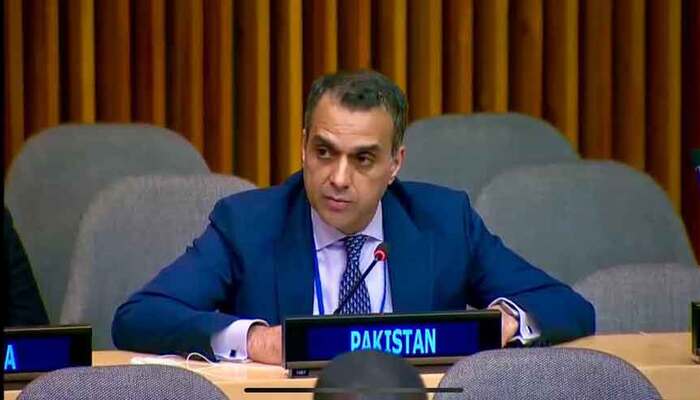
Pakistan strongly rejected Indian accusations of cross-border terrorism during a high-level UN Security Council (UNSC) debate, urging India to abandon its narrative of victimhood and blame-shifting. The exchange took place during discussions on promoting international peace through multilateralism and peaceful dispute resolution.
Firm Response by Pakistan
Addressing the 15-member UNSC on Tuesday evening, Ambassador Usman Jadoon, Pakistan’s deputy permanent representative to the UN, accused India of being the real sponsor of terrorism in the region. He said, “It is India which actively sponsors, aids and abets terrorism in my country and beyond.”
Jadoon’s statement came in response to Indian Ambassador Parvathaneni Harish, who earlier criticized Pakistan for allegedly backing cross-border attacks. The heated exchange followed remarks by Pakistani Deputy Prime Minister and Foreign Minister Ishaq Dar, who stressed the importance of resolving the Kashmir issue through peaceful means.
Read: Lahore Launches Eco-Friendly Electric Tram Pilot
India Accused of Ignoring UN Resolutions
Ambassador Jadoon emphasized that India continues to occupy Jammu and Kashmir illegally. He said India had violated Security Council resolutions and denied the Kashmiri people their right to self-determination.
“India claims to respect the UN Charter and the principle of peaceful dispute resolution. Yet it ignores the UNSC resolutions on Kashmir,” he added. Jadoon also highlighted reports from international rights groups about India’s human rights violations in the occupied territory and its mistreatment of minorities.
Water Dispute Raised
The Pakistani envoy criticized India’s handling of the Indus Waters Treaty. He claimed India had unilaterally suspended the agreement with the intent of depriving Pakistan of its rightful share of river water. “This is another blatant violation of international law,” Jadoon said.
May Border Clashes Highlighted
Referring to the cross-border military escalation in early May, Jadoon said India launched unprovoked attacks on civilian areas in Pakistan, including women and children. He called Pakistan’s response “measured but firm,” claiming it targeted only military assets and led to the downing of six Indian aircraft.
He credited Pakistan’s “position of strength and responsible approach” for ending hostilities, also acknowledging the U.S. role in facilitating de-escalation. “Our approach was rooted in self-defense and international law,” he told UNSC delegates.
India Accused of Hypocrisy
Jadoon pointed out the irony of India refusing to implement UN resolutions despite being the party that originally brought the Kashmir issue to the Security Council. He urged India to reflect on its behavior instead of painting itself as a victim.
He said, “India must stop hiding behind rhetoric and start complying with international legal obligations. Its actions contradict the very principles this Council upholds.”
India’s Sharp Retort
In its reply, India accused Pakistan of being “steeped in fanaticism and terrorism.” The Indian envoy also referred to Pakistan’s financial reliance on international loans, calling it a “serial borrower from the IMF.”
He cited the recent terror attack in Pahalgam, Jammu and Kashmir, and mentioned India’s response under Operation Sindoor. He insisted that “there should be a serious cost” for states that violate peaceful coexistence through cross-border violence.
UN Debate to Continue
The session, convened by Pakistan to advocate for the peaceful resolution of disputes, drew participation from several high-level representatives. The Council had earlier unanimously reaffirmed support for the UN Charter and the peaceful settlement of international disputes.
The UNSC debate will continue on July 24, with more countries expected to speak. Meanwhile, the strong exchange between India and Pakistan has once again highlighted the deep divisions over Kashmir and regional peace.
The session also drew attention to growing global concerns over the unresolved Kashmir dispute and its potential to destabilize South Asia. Several member states emphasized the importance of dialogue, urging both nuclear-armed neighbors to engage constructively and uphold international commitments to peace and justice
